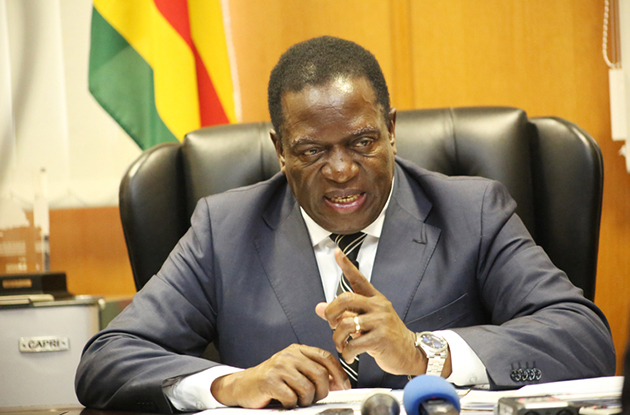Boost for command agriculture

Vice President Emmerson Mnangagwa
Felex Share Senior Reporter
Fertiliser and maize seed producers yesterday assured the nation of adequate inputs for the forthcoming season to support Government’s $500 million command agriculture programme.
The firms said they have 40 000 tonnes in place, while fertiliser stocks stand at 60 000 tonnes (top dressing) and 40 000 tonnes (compound).
It has also emerged that funding negotiations for the scheme were almost complete.
Also read:
This came out during a meeting between the manufacturers and Vice President Emmerson Mnangagwa yesterday as Government steps up efforts to operationalise the command agriculture scheme.
Play the video below:
The scheme seeks to ensure maize self-sufficiency.
Farmers unions, agrochemical dealers and officials from the Reserve Bank of Zimbabwe were also part of the meeting.
VP Mnangagwa — who chairs the Cabinet Committee on Food Security and Nutrition — was supported in the meeting by Ministers Douglas Mombeshora (Lands and Rural Resettlement), Joseph Made (Agriculture, Mechanisation and Irrigation Development), Oppah Muchinguri (Environment, Water and Climate), Christopher Mushohwe (Information, Media and Broadcasting Services), Samuel Undenge (Energy and Power Development) and Mike Bimha (Industry and Commerce).
Play the video below:
Minister Made said the scheme had been boosted by support from key stakeholders.
“The (maize) seed houses have 40 000 metric tonnes of seed for this season,” he said.
“In terms of what will be required for this programme and even beyond, the seed supply is fair. There will be adequate seed. The fertiliser companies have indicated that they are sitting on 60 000 tonnes of top dressing fertilisers and are in the region of 40 000 of compounds, which is sufficient enough to kick start the programme.”
Minister Made added: “What is critical from what the fertilisers manufactures have said is that they would like to be assisted in acquiring raw materials so that they speed up the manufacturing of fertilisers. They manufacture fertilisers on a continual basis so they need certain raw materials in terms of constituting the fertilisers. Otherwise they are prepared. The companies expressed gratitude that this programme will see a stimulation of the economy because it’s the driving factor of the input suppliers who otherwise last season, because of the drought, were seated with some stocks. With this programme they are able to push up their stocks.”
The programme, which aims to produce two million tonnes of maize on 400 000 hectares of land, will see identified farmers being given inputs, irrigation and mechanised equipment.
The farmers, to work under strict supervision, will be required to commit five tonnes per hectare to Government as repayment for the inputs and agricultural equipment.
They will retain all surplus produced for personal use.
VP Mnangagwa said Government was excited that critical organisations were geared to support the programme.
He said no farmer would be forced to take part in the scheme.
“No one is going to be forced to go into the programme, it’s on a voluntary basis,” VP Mnangagwa said.
“When we move around identifying the farms, we will not force anyone to go into the programme. The response is overwhelming that we don’t need to persuade people to come into the programme. We are also looking at water and electricity tariffs and at the next meeting we might be able to tell you the tariff that will be operational. We are also fully aware of the cost of production on the farming sector and we are working on reducing it.”
Participating farmers would be required to sign a performance contract for three consecutive growing seasons commencing with the 20016-17 summer season.
On funding, VP Mnangagwa said: “We are happy that for the current season, we are well advanced in negotiating the funding and a number of private sector companies are coming forward because this is guaranteed that they will have a benefit.”
VP Mnangagwa said Zimbabwe had all the necessary ingredients to be food secure.
“We have the land and control over it, we have hardworking people who need to be empowered and we need water,” he said.
“Water comes from rain and the only thing we have no control over is the programme of the Almighty (God) above that is how he distributes his rain but we should have control on the amount of rainfall that comes into Zimbabwe. We have a lot of water bodies which we must use to the fullest.”
Other programmes like the Presidential Input Scheme will remain in place to complement the command agriculture.
The decision to embark on command agriculture was arrived at after a realisation that national food insecurity had risen from about 12 percent in 2011 to 42 percent this year.
The Zimbabwe Vulnerability Assessment Report says four million people are in need of food aid this year because of an El-Nino-induced drought.










Comments